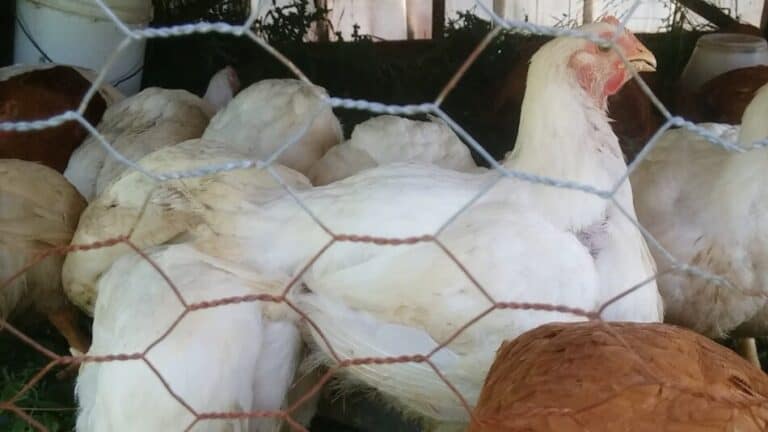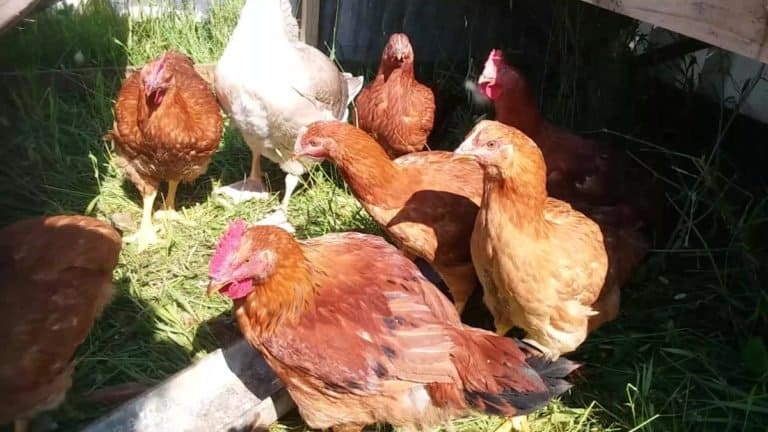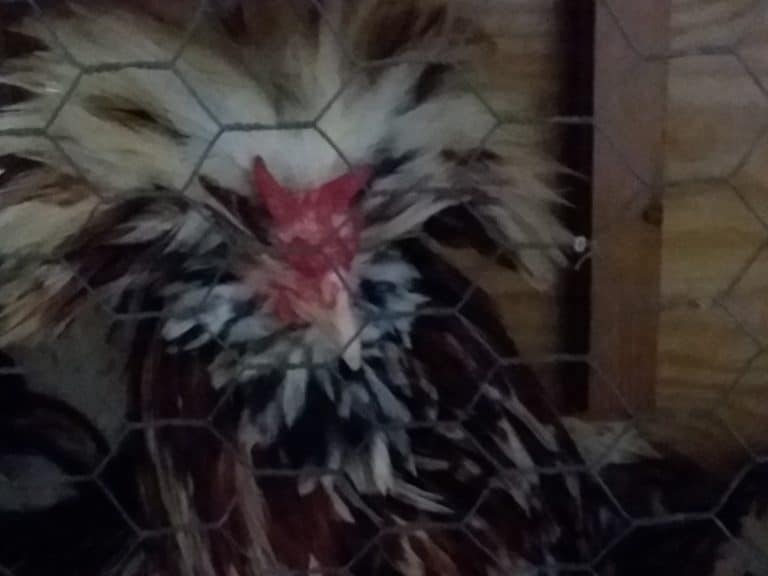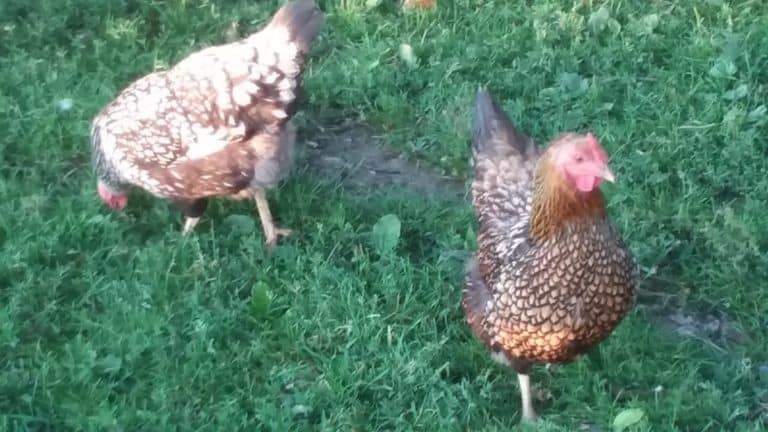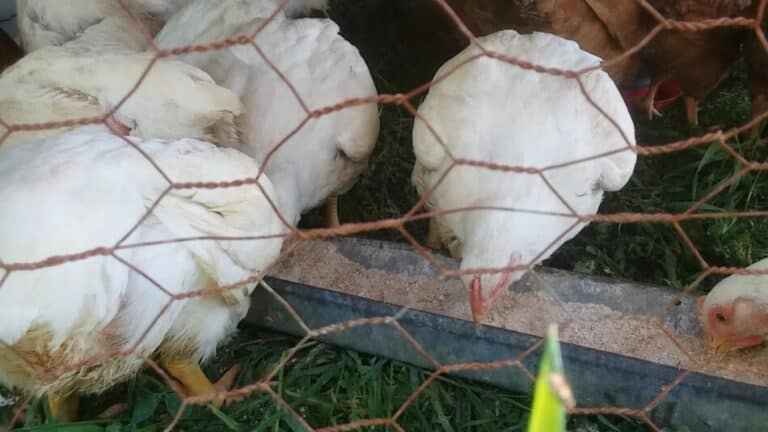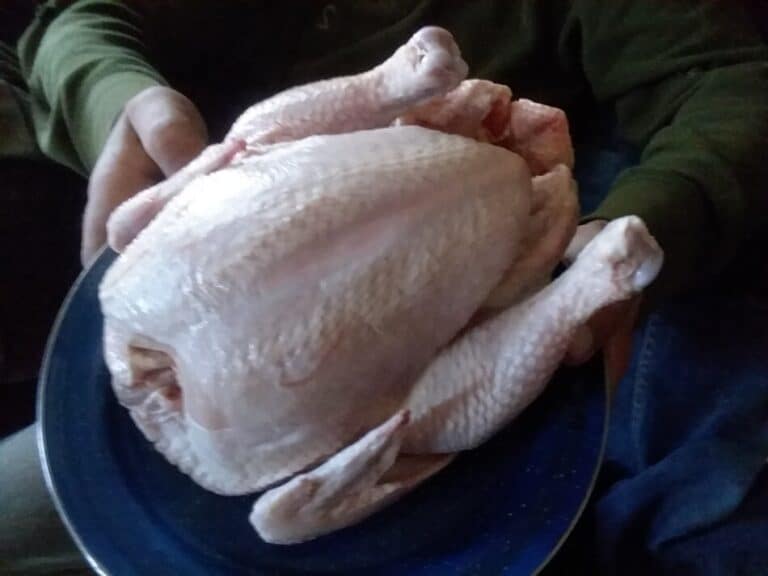5 Birds That Can With Live Chickens!
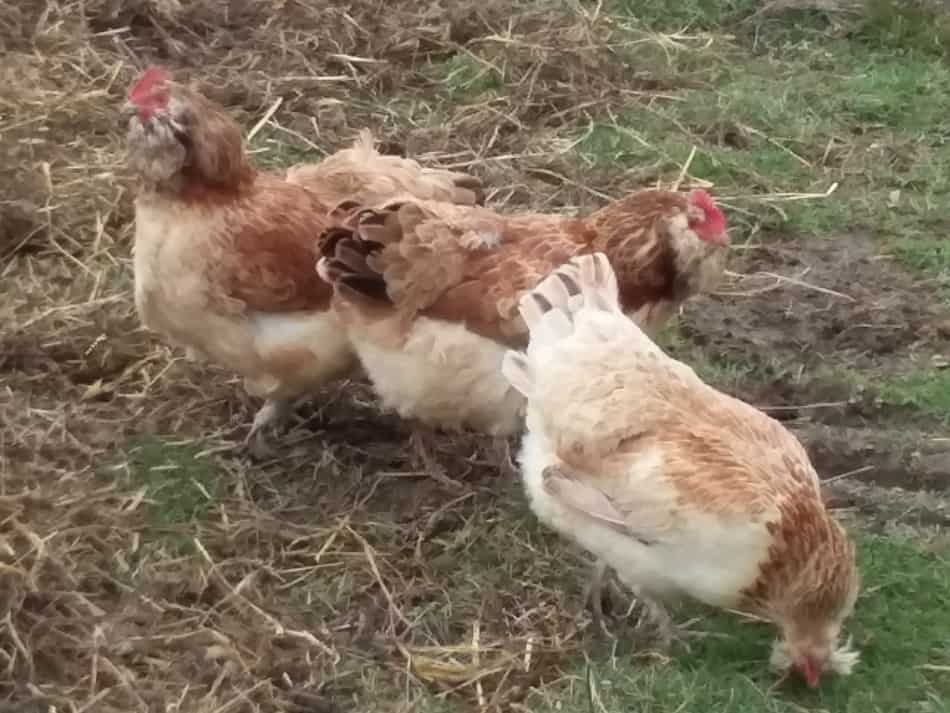
It’s happening again, you’ve got that urge to add more birds to your flock! You’ve already got a few chickens and now you want to spice things up with a different bird this time!
What are some options of birds that will live well with your chickens?
Adult birds that can live with chickens are ducks, geese, guineas, peafowl and turkeys. Birds that are not yet adult size, game birds and all broilers need to be raised separately from adult chickens.
We have a variety of birds, all running about in the yard. For the most part they get along just fine, but there are a few things to watch out for to keep the peace. Or at least as peaceful as things can be with guineas around!
These are the domestic birds that we have running with our chickens everyday:
- Ducks
- Geese
- Guineas
- Peafowl
- Turkeys
There are a few birds we do not have with the mixed flock of farm birds:
- Broilers
- Quail
- Game birds
We have had broilers, quail and other game birds over the years, none of which are good chicken buddies, each for different reasons listed in the next to last section.
If you are interested in broilers, read my article Red Rangers vs. Cornish Cross Broilers.
General guidelines that apply to all poultry are listed at the bottom of the article.
Ducks and chickens do well together
Adults live together: Yes, normally they get along well
Babies brooded together: No, brood separately

Chickens and ducks can get along well, as long as they are not nesting or raising babies, then they need more space. Overall, chickens and ducks seem to get along just fine.
As far as feed goes, both chickens and ducks will need the same basic feed, if both are adults. Be careful that your feed is non medicated, of course.
If your chickens and ducks are both laying, good news, they take the same layer mash! Read my article on Backyard Eggs for more on ducks for eggs!
For the eggs, you’ll want to have a separate nesting box for the chickens, since the ducks are heavy and you don’t want them breaking eggs.
If you have multiple level nesting boxes, the ducks will go to the lower ones and the chickens will generally pick the higher ones.
The important part is that they can choose.
Water is the main challenge with ducks
The challenge about raising ducks and chickens is the water. Ducks will make a mess of the water, seriously.
In about 5 minutes that clean water will be a cloudy mess, trust me.
Plus, if the ducks can climb in the water, they will surely poop in it, it’s an automatic duck thing.
The chickens don’t really care about muddy or cloudy water, they’re not overly picky drinkers, but poopy water is not good for anyone!
Being out of water, like when the ducks splash it all out, that’s a problem, but dirty water, not a big deal to chickens or ducks.
As long as the water gets changed daily, it will be fine with both the chickens and the ducks.
Don’t mix nests and/or hatching
If either your chickens or ducks are nesting be sure to keep an eye on the eggs in the nest, preferably before she starts setting.
Mixed eggs, as in duck and chicken eggs in the same nest will be a problem.
Our ducks are great at finding hidden places to nest which is great as long as they are setting on only duck eggs!
We frequently see baby chicks hatch out under a setting duck, since chicks take 21 days and ducklings take 28 days.
This means I need to find a place for the new chick, since the ducklings will be another week!
While the opposite can happen as well, a chicken hatching duck eggs, this seems to be much less frequent.
It could also be that the hen leaves with the chicks and the duck eggs get abandoned.
A chicken can hatch duckings, just make sure she has only duck eggs in the nest.
Ready to get some ducks? Here is an article I wrote giving the details on 16 Duck Breeds, check it out!
Geese and chickens are fine together
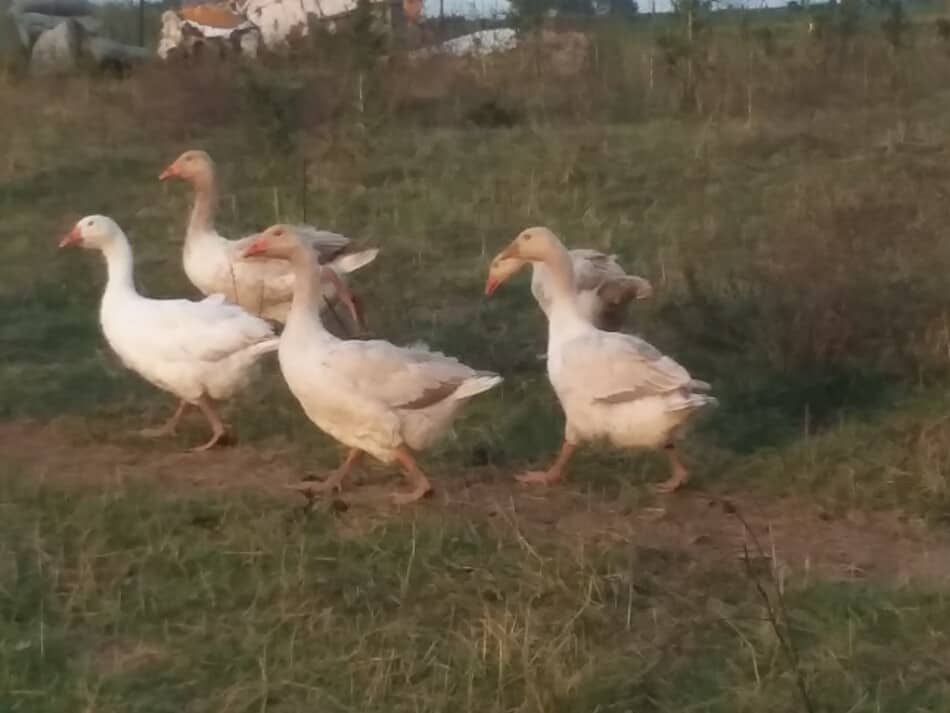
Adults live together: Yes, they normally get along fine
Babies brooded together: No, brood separately
Goslings are fast growers and kind of plow over anything in their way when they are zooming around the brooder.
Keep that in mind if you are planning on having chicks and goslings in the same brooder!
As far as adult birds, chickens and geese get along fine.
If you are feeding your geese, as adults they will be fine on the same feed as the chickens.
When they are young, the geese need a very different feed, much higher in protein, in order to grow well. If they are together as babies, feed the higher test feed to all.
Normally, they both kind of do their own thing through out the day then come in to the barn at night, with the chickens roosting and the geese bedding down in the straw.
They live separate lives if given the choice to roam about.
If your geese are in a pen, keep them separate from the chickens. Geese take more space than you might think and will not hesitate to get after a chicken “in their space.”
The only time these two really are competing is for grain in the winter, when the geese no longer have grass to eat.
Believe it or not, the geese spend all day out in the pasture eating grass and bugs and don’t really want grain.
The chickens like the grass and bugs and love to scratch around, but run toward me like crazy when they think it’s time to be fed!
Keep birds separate during nesting
The only caution here would be during nesting, and may not for the reasons you’d think. Of course, a chick could hatch out early under the goose, but that’s not the biggie.
The big concern is a chicken egg in the goose nest breaking and spoiling all of the goose eggs that get the runny egg mess on them.
The danger is that the goose is so much heavier than a chicken, so the goose eggs will be fine but the chicken eggs will break and foul the whole nest.
Keep chicken eggs out of the goose nests!
Peafowl and chickens get along
Adults live together: Yes, normally they are fine
Babies brooded together: No, brood separately, mom raised or purchased
The biggest challenge here is that peafowl can be mean.
Sometimes they are fine, other times, especially a mom with pea chicks is a meany. Keep her in a roomy place that is chicken free.
Overall, if you are okay with them eating the same food, our peafowl and chickens seem to do well together.
Actually, I think having chickens in the brooder with the young peafowl makes the peafowl less nervous when I feed them than if they were by themselves.
The chickens see me and think “yay, here’s the food” and the peafowl see this positive reaction and stay calmer.
The peafowl want the food as well, they are just more standoffish and not willing to “lower themselves” to begging like the chickens!
It’s a parasite thing for peafowl
Be aware that peafowl have huge problems dealing with parasites. Do your research and have a plan or your peafowl won’t last long.
Additionally, peafowl and turkeys seem to do poorly together, the turkeys seem to pass parasites to the peafowl.
Guineas and chickens are fine
Adults live together: Yes, if allowed to roam
Babies brooded together: No, different feed needs and picking
Guineas are high strung and loud. There is no getting around it. However, they seem to get on well with chickens most of the time.
By most of the time I mean, not during mating season and not in a pen.
Guineas during mating season are extra fruity and will pick fights with most anything. Not that it amounts to much, but it’s the thought that counts!
The other point to remember is not in a pen. Guineas in a pen are a stressed out mess, especially if they have never been in a pen before.
Guineas raised in a brooder seem to be more pen tolerant, but definitely need out as soon as they are big enough.
Is Raising Guineas Worth It? gives you a breakdown of costs to raise and keep your guineas.
Guineas need room to roam
Let them loose and they will be fine with the rest of your chickens.
They will even learn to come when you feed, just like the chickens but won’t get as close to you as the chickens will.
Side note: Baby guineas seem to be little meanies in the brooder, they pick at, well, anything and everything.
Keep them separate from other birds until they are old enough to be turned out.
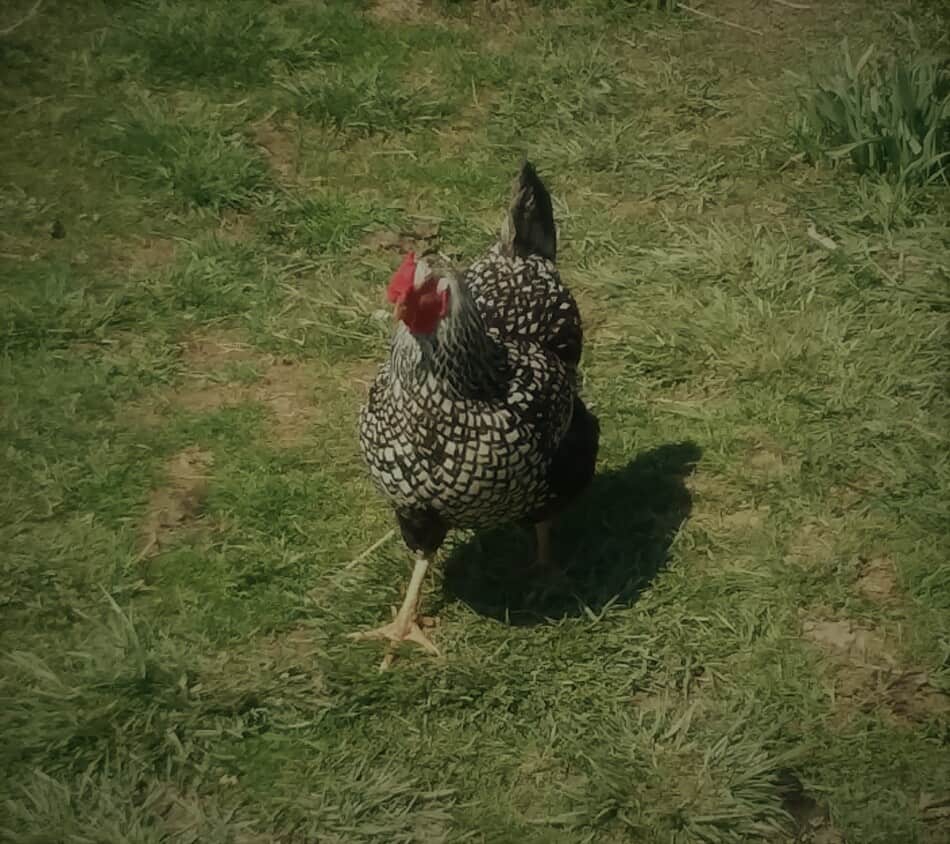
Turkeys and chickens get along
Adults live together: Yes, if allowed to roam
Babies brooded together: No, different feeds needed for each bird
Roaming about in your yard, turkeys and chickens get along just fine. In a brooder, not so much (a few chicks are okay, just not many).
On the plus side, adult turkeys are no harder to contain that chickens, they are just bigger.
Be aware that the heritage breed birds can and will roost, same with the lighter breed chickens!
Having turkeys and chickens growing up together is another feed issue.
Turkeys will need a more expensive feed, especially broad breasted whites, to keep up with their energy and growth needs.
Chickens don’t need this feed, but will sure eat it!
It should be mentioned that a few chicks will show the turkey poults where the food and water is in the brooder, just a few are needed.
Lots of chicks with the poults will be sucking down more expensive feed than the chicks need and costing you more to raise the chickens than it should.
Once again, if we just have a few surprise chicks show up, of course we put them in the brooder with the turkey poults.
But if we have a good amount of chicks, we would keep them separate or at least split the brooder area into a chick side and a turkey poult side.
10 Breeds Of Turkeys is an article I wrote to give you a list of your options, especially if you want turkeys that you keep year round.
Turkeys are challenging to brood
In our experience, turkeys are one of the more challenging birds to raise in a brooder.
Not really sure why that is. They seem to either do really well, or start dropping like flies.
I’m speaking of poults that we would have incubated here, hopefully the commercial birds from the hatcheries are more reliable.
4 Ways To Get Turkey Poults To Eat And Drink gives you the tricks we use to make sure our poults get off to a great start.
Side note: If you are thinking to let the turkey mom raise the poults, don’t. Especially if she is not in a pen.
She’s a great hatcher but nearly the world’s worst a keeping track of babies when she walks around.
It’s shocking how many poults a turkey mom can leave trailed out all over the place, don’t let this happen to your birds.
Chickens will also be more pushy than turkeys of the same size, since they are so different in age. If you have young turkeys in with adult chickens, the chickens will be bossy.
Once they get to be adults the turkeys will hold their own, but when smaller, the turkeys will be bossed around by the chickens, especially adult chickens.
Risk of raising turkeys and chickens together
I have read online that there is a risk of disease keeping chickens and turkeys together, but we do not worry about it. Here’s an article from Cackle Hatchery explaining the issue.
If you are concerned, ask a local vet for the scoop and some advice on how to keep these two birds together.
Overall, I believe that healthy birds resist disease and birds in heavy confinement are more susceptible to disease. As long as I keep my birds happy and healthy, they will stay disease free.
Anytime you bring a new bird to your flock you run the risk of introducing disease and will have to decide if it is worth the risk to you.
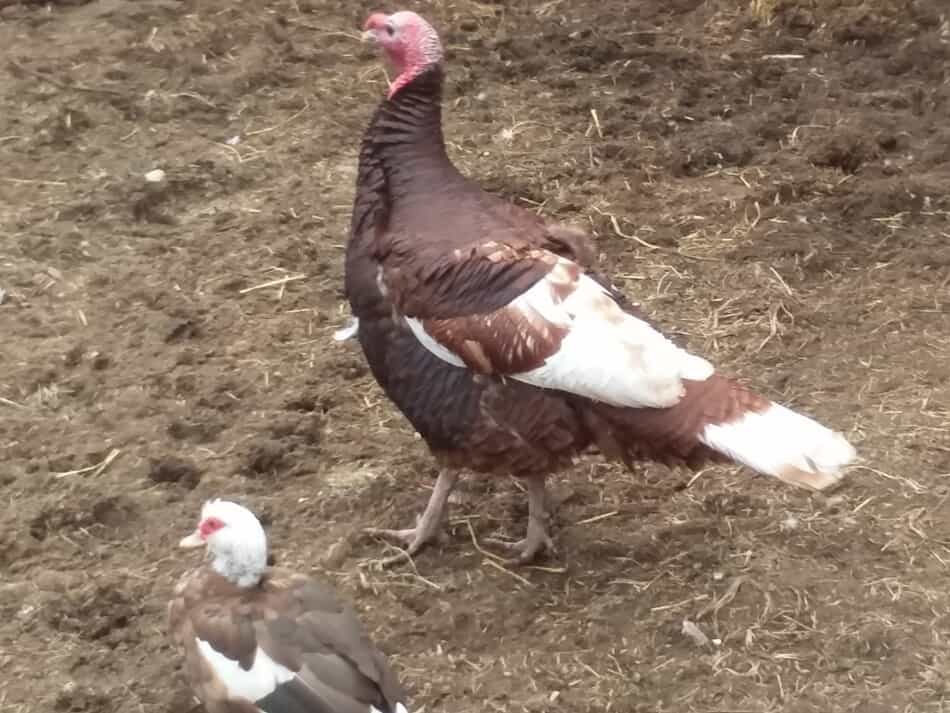
Birds that do not combine well with backyard chickens!
There are a few birds that do not combine well with your backyard chickens.
Here are a few combinations that are a bad idea and why they are not recommended.
Broilers should not be raised with other chickens
You would think that since broilers are also chickens that they would be fine with backyard chickens, not so.
The biggest problem here it that the backyard chickens will steal the broiler feed, since it will be a richer, higher protein feed.
Really what it comes down to here is you wasting money.
The second thing likely to happen is the backyard chickens, especially if they are adults, are going to be more pushy about how things work than the broilers, who are naturally more slow moving easy going chickens.
This means bullying by the traditional breed chickens.
I have to admit, I have raised a few traditional breed chickens with a pen of broilers. Only because it doesn’t make sense to set up an extra brooder for a handful of chicks.
If you have more than a few traditional breed chicks, consider a separate brooder for them and the broilers once the difference in size becomes apparent or you want to feed the groups different feeds.
The broilers must be kept on the higher protein feeds to be healthy! Do not give both chicks the normal chick feed, the broilers will suffer. Split the group.
Save your broilers the stress and you the extra feed money by keeping broilers and backyard chickens separate.
Quail need to be in a pen, not free roaming
Even the domestic breeds of quail will not combine well with chickens. This is more of a pen issue than anything.
Quail need a much more secure, no holes or other tiny openings, pen than chickens need.
Plus chickens always make sure they are first, leaving the quail with less feed.
Not to mention the quail need higher protein (more expensive) feed than the chickens and you can be sure the chickens will be sucking down more than their fair share of the feed, pricey or not!
Game birds should not be raised with chickens
Game birds like pheasants or bob whites tend to be flightly and harder to manage than chickens. And they can be really mean to other birds, including their own comrades in the same pen.
Putting chickens and game birds together makes the chickens lead a higher stress life. Give your chickens a break by keeping them separate from the game birds.
General guidelines for combining birds
First thing, the chickens I am referring to in this article are the chickens we have at our place, which are a happy mix of breeds of traditional type chickens.
For example we have some Wyandottes, Barred Rocks, Salmon Faverolles, Easter Eggers, Buckeyes (these were given to us, so this is a guess), an Andulasian, Americaunas and mixes of the group that have happened over the years.
As you can guess, we get a nice variety of eggs.
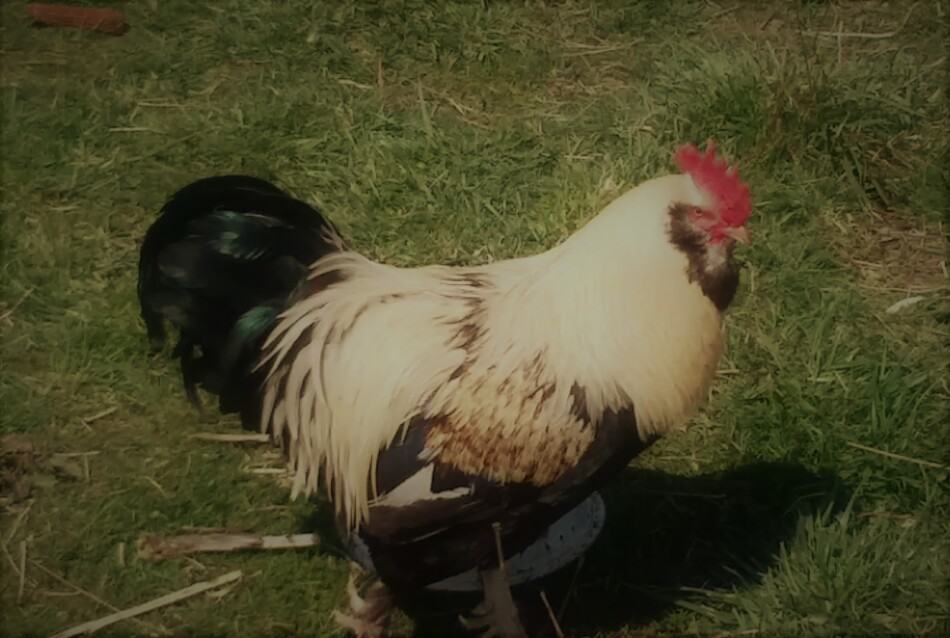
They are a nice, happy flock of barnyard chickens that zoom around and eat bugs.
When we raise a batch of broilers, whether white or red ranger type, these are handled completely separately from the barnyard chickens.
Things are generally fine with different species of adults mixed together, but when these birds are babies, you need to raise them in separate brooders or at least divide the brooder.
Do not raise them all in the same group when they are newly hatched.
Even if you get them on the same day from the same hatchery, split the group. The hatchery will send you instructions on how to raise a mixed flock from all newly hatched babies.
Key things to keep in mind with mixed flocks of birds
- To a bird, might makes right, it’s just how they think
- Separate by age, size matters less
- If the group has different feed needs, the whole group needs the more expensive/higher protein feed. If you won’t do that, separate the group. Do not skimp on feed.
- When a mom is nesting she will be territorial.
- When her babies hatch she will defend her space, that space moves with her as she and the babies zoom around.
- If you see a bird getting picked on, remove it from the group.
- Plenty of space will decrease problems between birds. Tight spacing will increase problems.
Overall, I love having a variety of poultry around.
They all are a bit different in their likes and dislikes, so each one has a special skill to contribute to the farm, a benefit you’ll only get with a mixed flock.
